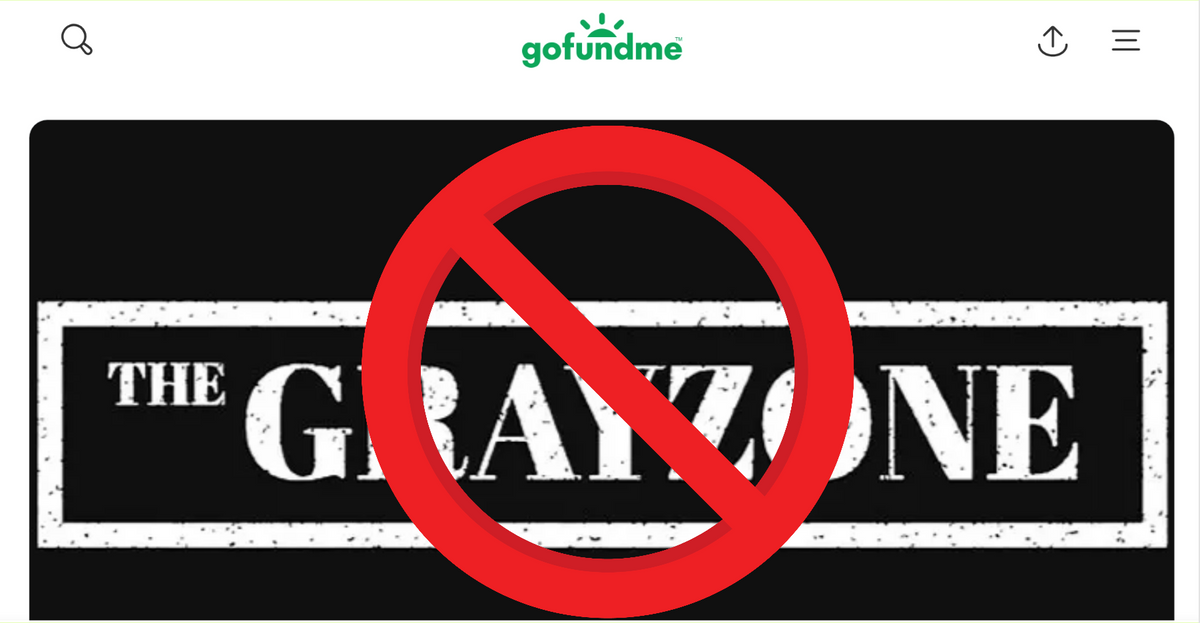GoFundMe Stops Grayzone News Website From Using Service

Support independent journalism on whistleblowers, secrecy, and press freedom-related issues. Become a subscriber of The Dissenter.
The crowdfunding platform GoFundMe halted a fundraiser for the news website the Grayzone and refused to transfer over $90,000 raised to the organization.
When Grayzone editor-in-chief Max Blumenthal requested an explanation on August 19, a representative with GoFundMe’s Trust and Safety Team claimed, “Due to some external concerns, we need to review your fundraiser to make sure it complies with our Terms of Service.”
Eight days later, GoFundMe had provided no additional information on their “review.”
GoFundMe’s censorship is the latest in a series of actions by platforms against news websites that are known for opposing United States foreign policy doctrine.
MintPress News had their fundraiser taken down by GoFundMe in March 2022. The following month PayPal banned the organization and MintPress News editor-in-chief Mnar Adley from using the payment processor. Adley was given no explanation for the decision.
In May 2022, Consortium News was similarly banned from fundraising through PayPal. Consortium News editor-in-chief Joe Lauria spoke with an agent in PayPal’s “escalation department.” But again PayPal refused to share details related to the decision to prohibit Consortium News from using the corporation’s services.
These news sites are well-known for scrutinizing U.S. military branches and security agencies and the patchwork of relationships that current and former officials have formed with media organizations, think tanks, and public relations firms.
According to Blumenthal, GoFundMe has agreed to return the funds to donors. The Grayzone has directed donors to give through a new fundraiser posted to Spotfund.
That strongly suggests that stopping donations was never about enforcing GoFundMe’s terms of service. The platform’s goal was to coerce the organization to go somewhere else to fundraise so GoFundMe did not have to deal with pressure from the Grayzone's vocal detractors in and outside of government.
One of the journalists the Grayzone fundraiser was intended to support is Kit Klarenberg, who British counter-terrorism police detained and interrogated at the London Luton Airport on May 19.
British police questioned Klarenberg about his journalism for the Grayzone and seized his electronic devices. He was asked about his views on the war in Ukraine. While he has not been charged with a crime, an investigation against Klarenberg is still pending.
The fundraiser was also supposed to help pay journalist Wyatt Reed, who was banned from PayPal in June 2022 and then Venmo in November that same year.
In October 2022, Reed traveled to the Donbas to report on the other side of the war in Ukraine—what the war looked like for people living in the Donetsk and Luhansk regions aligned with Russia. While Reed was in his hotel, it was shelled.
PayPal, Venmo, GoFundMe, and other crowdfunding or payment processing platforms face no requirement to be transparent with their users. They can arbitrarily revoke access to their services and follow a blueprint that was largely established in response to WikiLeaks.
As I recounted in my book, Guilty of Journalism: The Political Case Against Julian Assange, on December 3, 2010, PayPal blocked WikiLeaks. The corporation initially maintained that they had done so because the U.S. State Department had concluded that WikiLeaks’ “activities were illegal in the U.S.” (The State Department denied pressuring PayPal.)
The censorship by PayPal convinced Visa and MasterCard to also block donations to WikiLeaks. PostFinance, the financial arm of the Swiss post office, also followed suit and froze the accounts of WikiLeaks editor-in-chief Julian Assange.
Bank of America banned donations to WikiLeaks on December 18. Later, it was learned that the multinational investment bank had plotted with Palantir, Berico Technologies, and HBGary Federal to disrupt WikiLeaks because Bank Of America was afraid of becoming a WikiLeaks target.
Assange has been detained at the Belmarsh high-security prison in London, awaiting possible extradition from the United Kingdom to the U.S. He faces 17 unprecedented Espionage Act charges that were brought by the U.S. Justice Department.
The journalism that ultimately spurred PayPal to block WikiLeaks is the same journalism that U.S. prosecutors have criminalized in their political case against Assange.
When faced with the financial blockade (that ended a few years later), Assange said, “What we are seeing here are dangerous moves towards a digital McCarthyism. These actions, and the others like it, are not the result of a legal process, but rather are a result of fear of falling out of favor with Washington.”
Little has changed. PayPal, Venmo, GoFundMe, etc, are all afraid of regulation or greater interference by the government. The companies preemptively ban journalists or media organizations, which are considered to be disloyal and repugnant, especially as they challenge the agenda of the U.S. and North American Treaty Organization (NATO) during wartime.
At the height of the censorship against WikiLeaks, the Freedom of the Press Foundation (FPF) “accepted donations on behalf of WikiLeaks readers.” They did so because WikiLeaks publications were “clearly protected speech” and “no court ever ruled WikiLeaks had broken any laws.” FPF recognized companies were circumventing the First Amendment.
In 2017, FPF announced that the blockade had been over for some time. “We consider the end of the unjust financial blockade an important victory for free expression. We are proud to have been an avenue for WikiLeaks readers to express themselves for the past several years. And if a press organization faces such a blockade again, we plan on being there to fight it.”
Consortium News, MintPress News, and The Grayzone have never been notified that they were suspected of violating any U.S. law or regulation. Instead, companies opaquely deny them access to their services seemingly because they oppose U.S. imperialism and happen to enjoy a wide enough readership to make an impact through their reporting and commentary.
While suppressing such news sites, they infringe upon the freedom of readers to express themselves through their donations.




Comments ()